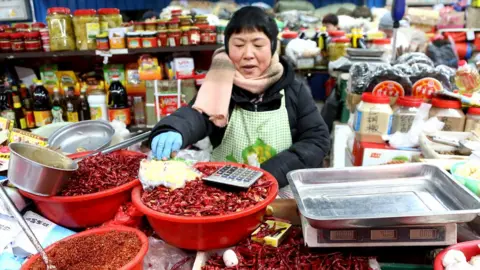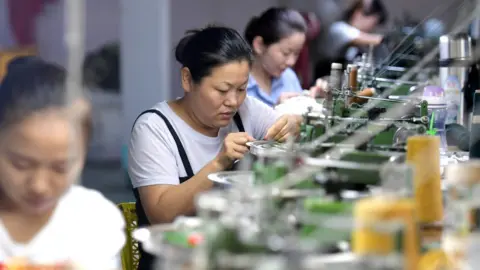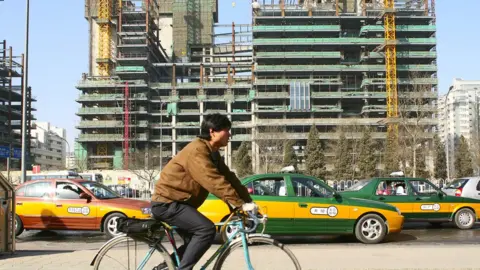Why China is under pressure to make a trade deal
 Getty Images
Getty ImagesIn Washington this week, the US and China are due to hold their highest level talks since the two sides struck a temporary truce to their trade war.
They have until 1 March to come up with some sort of compromise or tariffs will be hiked again, and we march back into a trade fight that affects us all.
China watchers tell me Beijing is under increasing pressure to make a deal.
Here's why:
A slowing economy
The trade war may not have caused China's slowdown, but it is definitely making things worse.
Growth data released last week showed China posted the slowest growth rate since 1990 but that in itself is not as worrying as other data points, including that consumer sentiment and retail sales are flatlining or weakening fast.
Small and medium-sized companies in China are feeling the chill with lower orders and inventories.
Just how much pressure the Communist Party is facing because of a weakening economy was reflected in a rare acknowledgement by President Xi Jinping, whose legitimacy is based in part in keeping China strong.
Losing its factory lustre?
There is also evidence to show that foreign firms are diversifying their sourcing, production and supply chains away from China, if not pulling out altogether.
This recent survey conducted by QIMA, a leading Asian supply chain auditor, shows that 30% of more than 100 global businesses are diverting their sourcing from China to other countries.
 Getty Images
Getty ImagesAs many as three-quarters of these companies have started sourcing suppliers in new countries.
If this trend continues then jobs in Chinese factories are at risk - a recent report looking at China's economy by JP Morgan points to rising unemployment as a major near-term risks.
Social stability is predicated on China's economic stability, and the Communist Party is well aware that its credibility lies in delivering the Chinese dream to its people.
The Huawei factor
The fate of Huawei also hangs in the balance, both from a business and diplomatic standpoint.
China is big on symbolism and "doesn't believe in coincidences" Einar Tangen, an advisor on economic affairs for the Chinese government, told me on the line from Beijing.
Mr Tangen pointed to the arrest of Meng Wanzhou, the daughter of Huawei founder, which took place on the day President Xi and US President Donald Trump met at the G20 summit and declared the temporary truce between the two sides, setting the 90 day deadline for talks.
Another date looms next week, with the latest round of talks taking place on the day the US has to file the extradition treaty for Ms Meng.
"Both of these dates are seen as attempts by the US to use Huawei as leverage in the trade talks," says Mr Tangen.
The US is also reportedly preparing an investigation into Huawei which could see it banned from buying American chips, a move that crippled China's ZTE last year.
 Getty Images
Getty ImagesMr Tangen warns that pushing Beijing will backfire.
"The Chinese see this as the US trying to push China down," he says.
"This is not about right or wrong. They view this in context of the 100 years of humiliation they suffered at the hands of the West and they don't want that repeated."
American firms want a deal
But the US is also under pressure to make a deal.
American firms in China have complained about the impact of Trump's tariffs on their business but want the US to make a good deal.
"This administration has been willing to risk the health of the US economy with tariffs," says Stephen Kho, international trade partner at law firm Akin Gump in Washington DC.
"So now that we've come this far, businesses want to take advantage of this moment and walk away from these talks with something significant. They will want to see China's offer to buy more American goods along with promises of systemic changes."
A solution to the US-China trade war is good for us all.
The longer these two superpowers slap tariffs on each other's goods, the more expensive products will be for us, companies will report lower profits, and global growth will slow.
Both sides are under pressure to make a deal. But this is ultimately, as Mr Kho also points out, "a game of chicken." Whoever blinks first could also be the biggest loser.
